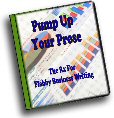Business Presentations
Tips to polish those all-important business presentations
Successful business presentations boil down to solid organization and great communication. Whether you are selling a product or trying to persuade others to your point of view, your ability to communicate impacts your success and the way others perceive you.

You want your central message to be clear and your wording precise. You want to connect with your listeners. Often you will need to do both a presentation and written supplement in order to leave behind some material people can refer to later.
Whether you are presenting in-person or virtually, you should remember these important points about business presentations.
Plan around your central message. As you are developing your presentation, figure out your central message. What action do you want your listeners to take? You should be able to write your central message in a short, clear sentence. As you practice your talk, be sure that you find ways to repeat it near your opening and conclusion. Repetition helps listeners remember your main point.
You must inform. Tell listeners what they need to know about your product or service. How can you help solve a problem they are having?
You must establish credibility. People believe you know what you are talking about only after they are comfortable with your background, your demonstrated expertise or the values and interests they think you share with them. If you are not introduced by someone else or do not know your audience, figure out a way to establish your credibility with examples from your background or some shared values.
An audience will consider you credible based on a number of factors. These include
- Your confidence in presenting
- Your title, rank or authority
- Your ability to identify with the audience
- The value of your information.

What can you do to appear more confident?
Practice, practice, practice. The better you know your message the more at ease you will be with your delivery. You want your presentation to be like a conversation with your audience -- not a speech you are giving to them.
Pay attention to your posture. Stand tall, pull your shoulders back and move with ease.
Breathe deeply. Paying attention to breathing will help alleviate nervousness and also make you appear more in control.
Pay attention to your voice. Your voice is your instrument. Speak from your diaphragm rather than your throat. Practice vocal variety and pacing. To be sure your voice is in tip-top shape, you should do some vocal exercises regularly. Practicing tongue-twisters will do wonders for your enunciation.
Embrace the pause. Nervous speakers have a tendency to talk too fast and don't allow listeners time to absorb important points. Mark Twain was right: "No word was ever as effective as a rightly timed pause."
Other factors to consider with your presentation
You must persuade. If your field is sales or marketing, your goal is to get others to come over to your way of thinking and take action; that action could be buying a product, voting in favor of a program or approving a budget. Your job is to guide your listeners or readers to a point where they are ready to agree with your point of view.
Aristotle, the father of persuasion, said that persuasion involves facts, credibility and feelings -- logos, ethos and pathos. No one has come up with a better formula in the past 2000 years.
You must entertain. Entertainment is the commodity sadly lacking in many business presentations and is the element that sets the most successful people apart from the great masses. People must be engaged with you before they will give you their business. Making your audience laugh is one of the most reliable ways to increase likeability and find common ground with your clients.
You must avoid death by PowerPoint. Too many presenters bore audiences with screens full of data or words that would be much better distributed as a handout or takeaway. Worse still are those who turn around and read from the screen. Your listeners are perfectly capable of reading for themselves. Use PowerPoint as a supplement with visuals and limited text to highly significant points. You and your message are the main thing. . . not your PowerPoint.
This section will deal with speeches and presentations specifically tailored to the needs of those doing professional business work.
